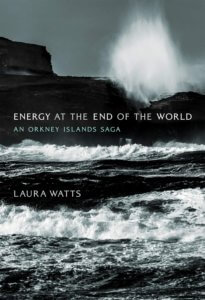Carson Prize 2021: Laura Watts
We are delighted to announce that the 2021 Rachel Carson Prize goes to Energy at the End of the World: An Orkney Islands Saga (MIT Press, 2019) by Laura Watts. The Award Committee received 78 books to consider for this year’s prize and shortlisted 10 works, evaluating their societal or political relevance and their contributions to public debate and social change. We found Energy at the End of the World: An Orkney Islands Saga to be exemplary in meeting these criteria, as well as in its overall scholarly quality and capacity to cast social or political issues in a new light.
Watts’ book offers an engaging, subtle and inspiring ethnography of energy practices and ecologies on Orkney. Her careful, imaginative accounts cunningly expand the time frames of eco-political transformation, thereby enabling unexpected capacities for action and forms of relevance to come to the surface. Presenting a sophisticated combination of empirical vignettes, speculative fiction, conceptual writing, poetry and photography, her Island Saga intertwines detailed descriptions, intimate narrative and fables of an alternative energy future. Adopting a methodology of dwelling in place, her work tells the stories of frequently overlooked people and places, painting lively portraits of forgotten ecologies, environments and infrastructures that still too often go unnoticed.

Watt’s ethnography, then, activates and renders accessible for audiences both close to and far from Orkney the possibilities and contradictions of how renewable energy futures are made and imagined in specific places, through multi-species infrastructural webs, with their attendant market logics and knowledge politics. In this moment where the acute impacts of anthropogenic climate change are becoming manifest with increasing severity, Watts’ Saga helps us to understand and feel how energy futures may be configured otherwise.
For all its contributions, we are pleased and honored to recognize Laura Watts’ Energy at the End of the World: An Orkney Islands Saga with the 2021 Rachel Carson Prize.
2021 Carson Prize Committee: María Belén Albornoz (Chair, Latin American Faculty of Social Sciences, Ecuador), Aalok Khandekar (IIT Hyderabad, India), Noortje Marres (University of Warwick, UK), Hsin-Hsing Chen (Shih-Hsin University, Taiwan).
Acceptance Statement
A book condenses the warmth and work from so many into its bound pages. This one especially: an ethnography of energy futures made with more than a decade of support from ‘Team Orkney’, the people I work with in Orkney, islands off the north coast of Scotland.
It is my privilege and honour to accept the Rachel Carson Prize 2021 from 4S with them, and with enormous thanks to everyone else who helped make the book what it is. In particular, to my mentors and colleagues from the wonderful Science & Technology Studies (STS) community around the world, who encouraged me to write with my own voice, who gave their time with enthusiasm to review my work, and who taught me to stay with the trouble–thank you. Special thanks to the 4S Prize Committee who read and reflected on my words with such care, and who do me and those involved in making this book such honour.
Rachel Carson wrote with passion and deep attention to literary craft. Her popular science books on marine biology demonstrated that academic writing can be both sophisticated and inclusive. She and others inspired me to write for everyone interested, for those facing climate change, for those who heard the latest IPCC report and want to act, right now, to make different energy futures where they live. I wanted to write to bring people to the important ideas that we have in STS–to make multispecies infrastructure as obvious as barnacles stuck to a tide energy turbine. And still I wanted to push the words to do hard academic work. The words pushed back in the end. Some of you have met the Electric Nemesis and her soldered-together skin and bone
This prize, in Rachel Carson’s name, reminds me of the power of careful words: the literal power in renewable energy needed to make and transmit them, as well as the political power well-written words have to enact change.
With her careful words Carson brought so many people into her world under the sea. Living isolated from friends and colleagues during this pandemic, I feel as if careful words matter more than ever. Words can travel without us. Our choice of words, how we sculpt and write our sentences, who we invite in as an audience, can change the ideas and imaginaries possible. Our words can make worlds–worlds more habitable, perhaps, if we consider each word we write.
This book is just one book in a long string of astonishing 4S Rachel Carson Prize books. There will be more words to come, words chosen with exquisite care. I look forward to reading them. Each word matters.
Write well.
Laura Watts
Orkney
August 2021
Bio
Laura Watts is an author, poet, ethnographer of futures, and Senior Lecturer in Energy & Society at the University of Edinburgh. As a Science & Technology Studies scholar her work is concerned with the effect of different writing methods and ‘edge’ landscapes on how the future is imagined and made. Energy at the end of the World: An Orkney Islands Saga (MIT Press) was Shortlisted for the Saltire Research Book of the Year and Longlisted for the Highland Book Prize. She co-edited Energy Worlds in Experiment (Mattering Press 2021) which includes a graphic novel chapter, and she has published numerous limited edition books and magazines of exploratory writing for industry and other communities. In 2017 she won the International Cultural Innovation Prize with the Reconstrained Design Group for a locally-built energy storage device designed from scrap. Her PhD is from the Centre for Science Studies, Lancaster University. She gives writing workshops worldwide, and provides ongoing consultancy and advice on speculative futures.
